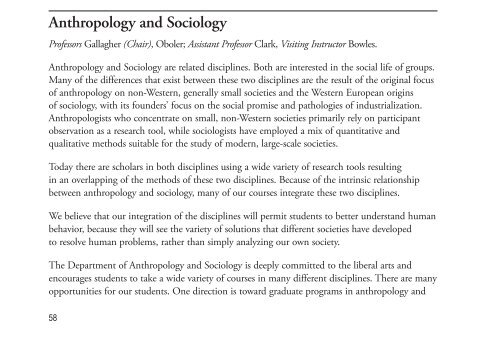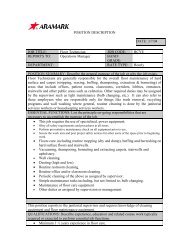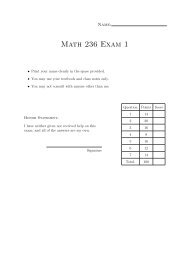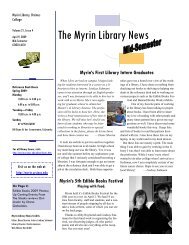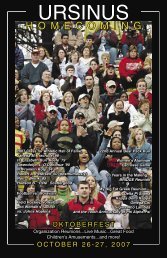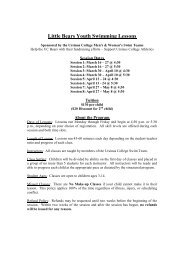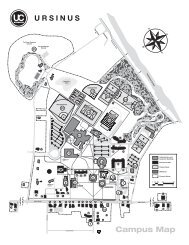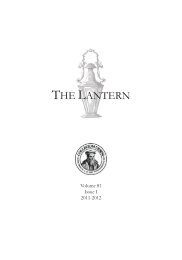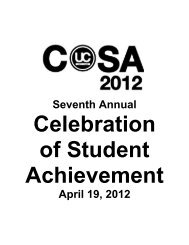Anthropology and Sociology - Ursinus College
Anthropology and Sociology - Ursinus College
Anthropology and Sociology - Ursinus College
Create successful ePaper yourself
Turn your PDF publications into a flip-book with our unique Google optimized e-Paper software.
<strong>Anthropology</strong> <strong>and</strong> <strong>Sociology</strong><br />
Professors Gallagher (Chair), Oboler; Assistant Professor Clark, Visiting Instructor Bowles.<br />
<strong>Anthropology</strong> <strong>and</strong> <strong>Sociology</strong> are related disciplines. Both are interested in the social life of groups.<br />
Many of the differences that exist between these two disciplines are the result of the original focus<br />
of anthropology on non-Western, generally small societies <strong>and</strong> the Western European origins<br />
of sociology, with its founders’ focus on the social promise <strong>and</strong> pathologies of industrialization.<br />
Anthropologists who concentrate on small, non-Western societies primarily rely on participant<br />
observation as a research tool, while sociologists have employed a mix of quantitative <strong>and</strong><br />
qualitative methods suitable for the study of modern, large-scale societies.<br />
Today there are scholars in both disciplines using a wide variety of research tools resulting<br />
in an overlapping of the methods of these two disciplines. Because of the intrinsic relationship<br />
between anthropology <strong>and</strong> sociology, many of our courses integrate these two disciplines.<br />
We believe that our integration of the disciplines will permit students to better underst<strong>and</strong> human<br />
behavior, because they will see the variety of solutions that different societies have developed<br />
to resolve human problems, rather than simply analyzing our own society.<br />
The Department of <strong>Anthropology</strong> <strong>and</strong> <strong>Sociology</strong> is deeply committed to the liberal arts <strong>and</strong><br />
encourages students to take a wide variety of courses in many different disciplines. There are many<br />
opportunities for our students. One direction is toward graduate programs in anthropology <strong>and</strong><br />
58
anthropology <strong>and</strong> sociology<br />
sociology, social work, law, public administration, criminology, regional planning, <strong>and</strong> a variety<br />
of other professional degrees in related applied disciplines. Another option is secondary education<br />
certification in social studies.<br />
Requirements for Majors<br />
All students majoring in anthropology <strong>and</strong> sociology must take ANTH-100 or SOC-100 or<br />
SOC-110; ANSO-150W (Writing in <strong>Anthropology</strong> <strong>and</strong> <strong>Sociology</strong>); ANSO-200 (Methods);<br />
ANSO-400 (History <strong>and</strong> Theories); ANSO-460W (Seminar); four additional courses at the 200<br />
level or above; <strong>and</strong> choose an emphasis in either anthropology or sociology. In addition, all majors<br />
are required to take MATH-241Q (Statistics I). Those interested in teaching certification in Social<br />
Studies should consult with the Education Department.<br />
<strong>Anthropology</strong> <strong>and</strong> <strong>Sociology</strong> majors can fulfill the college writing requirement by taking<br />
ANSO-150W, <strong>and</strong> the capstone <strong>and</strong> oral presentation requirements by taking ANSO-460W.<br />
I. <strong>Anthropology</strong> Emphasis<br />
Students choosing the anthropology emphasis must take a minimum of 36 semester hours<br />
in anthropology <strong>and</strong> sociology, including either eight credits of ethnography (chosen from<br />
ANTH-222, 232, 242 <strong>and</strong> SOC-255), or four credits of ethnography <strong>and</strong> ANTH-205,<br />
Introduction to Archeology, or ANTH-390, research, with a focus on physical anthropology <strong>and</strong><br />
prehistoric archaeology. ENGL-214, linguistics <strong>and</strong> modern grammar, may be taken by students<br />
with an anthropology emphasis as credit toward the major. In addition, it is recommended that<br />
anthropology majors fulfill their science requirement in biology, <strong>and</strong> choose one of the Area<br />
Studies minors offered at <strong>Ursinus</strong> (East Asian Studies or Latin American Studies).<br />
II. <strong>Sociology</strong> Emphasis<br />
Students choosing the sociology emphasis must take a minimum of 36 semester hours<br />
in anthropology <strong>and</strong> sociology. PSYC-440, Social Psychology, may be taken by students with<br />
a sociology emphasis as credit towards the major. In addition, four credit hours in psychology are<br />
encouraged. It is highly recommended that students choosing the sociology emphasis should take<br />
courses in other disciplines which will provide a broad insight into the human condition, whether<br />
these courses are in the humanities, sciences, or other social sciences. Students are encouraged<br />
to use this knowledge in their departmental courses.<br />
Requirements for Minors<br />
The Department of <strong>Anthropology</strong> <strong>and</strong> <strong>Sociology</strong> offers minors in both anthropology <strong>and</strong><br />
sociology. All students minoring in the Department must choose to complete the minor either<br />
in anthropology or in sociology.<br />
I. <strong>Anthropology</strong> Minor<br />
A minor in anthropology requires that students take a minimum of 20 semester hours in<br />
anthropology. These courses must include ANTH-100 (SOC-100 or SOC-110 may be<br />
substituted) <strong>and</strong> at least four credits of ethnography (ANTH-222, 232, 242 or SOC-255).<br />
Note: With the possible exception of SOC-100 or SOC-110, courses for the minor should be selected<br />
either from the list of anthropology courses or the list of integrated anthropology/sociology courses.<br />
Only with special permission may they include courses from the list of sociology courses.<br />
59
ursinus college catalogue<br />
II. <strong>Sociology</strong> Minor<br />
A minor in sociology requires that students take a minimum of 20 semester hours in sociology.<br />
These courses must include SOC-100 or SOC-110 (ANTH-100 may be substituted) <strong>and</strong> at least<br />
two of the last three courses must be taken at the 200 level or above.<br />
Note: With the possible exception of ANTH-100, courses for the minor should be selected either from the list<br />
of sociology courses or the list of integrated anthropology/sociology courses. Only with special permission<br />
may they include courses from the list of anthropology courses.<br />
ANSO-150W. Writing in <strong>Anthropology</strong> <strong>and</strong> <strong>Sociology</strong> Dr. Oboler<br />
An introduction to expository writing in anthropology <strong>and</strong> sociology following the st<strong>and</strong>ards in both<br />
disciplines. Students will incorporate modern theory <strong>and</strong> methods in frequent short papers in order to learn<br />
strategies to help them with every stage of the writing process, from generating ideas to shaping arguments<br />
to revising drafts, to using the appropriate style format. Three hours per week. Four semester hours.<br />
ANSO-200. Methods in <strong>Anthropology</strong> <strong>and</strong> <strong>Sociology</strong> Faculty<br />
An introduction to data collection, analysis <strong>and</strong> interpretation in anthropology <strong>and</strong> sociology. Students<br />
will be exposed to a wide variety of data collection techniques including participant observation, interviews,<br />
questionnaires, existing source studies, <strong>and</strong> the like. Students will also learn how to analyze <strong>and</strong> interpret<br />
the data with the aid of statistics. Ultimately, they will examine the relationship between research <strong>and</strong> theory.<br />
Prerequisites: Any 100-level <strong>Anthropology</strong> or <strong>Sociology</strong> course, MATH-241Q as a pre- or co-requisite,<br />
or permission of the instructor. Three hours of lecture <strong>and</strong> discussion plus two hours of lab per week.<br />
Four semester hours.<br />
ANSO-381. <strong>Anthropology</strong> <strong>and</strong> <strong>Sociology</strong> Internship Faculty<br />
An off-campus academic/work experience under the supervision of an internship adviser <strong>and</strong> an on-site<br />
supervisor. Contact any member of the Department for further information. Prerequisites: A major in<br />
anthropology <strong>and</strong> sociology, junior st<strong>and</strong>ing, at least 12 credits in anthropology/sociology, <strong>and</strong> approval<br />
of the Department internship adviser. A minimum of 160 hours. Graded S/U. Four semester hours. (I.)<br />
ANSO-382. <strong>Anthropology</strong> <strong>and</strong> <strong>Sociology</strong> Internship Faculty<br />
An off-campus academic/work experience under the supervision of an internship adviser <strong>and</strong> an on-site<br />
supervisor. Contact any member of the Department for further information. Prerequisites: A major in<br />
anthropology <strong>and</strong> sociology, at least 12 credits in anthropology/sociology, <strong>and</strong> approval of the Department<br />
internship adviser. 120 hours per semester. Graded S/U. Three semester hours. (I.)<br />
ANSO-400. History <strong>and</strong> Theories of <strong>Anthropology</strong> <strong>and</strong> <strong>Sociology</strong> Dr. Gallagher<br />
A study of anthropology <strong>and</strong> sociology within the framework of Western thought. An analysis of the<br />
development of anthropological <strong>and</strong> sociological theory from the 19th century until today. Prerequisites:<br />
Any 100-level course in <strong>Anthropology</strong> or <strong>Sociology</strong>, <strong>and</strong> ANSO-150W (Writing in <strong>Anthropology</strong> <strong>and</strong><br />
<strong>Sociology</strong>). When possible, students should also have completed ANSO-200 (Methods). Three hours<br />
per week. Four semester hours. (SS.)<br />
ANSO-460W. Seminar in <strong>Anthropology</strong> <strong>and</strong> <strong>Sociology</strong> Faculty<br />
Seminar is the capstone course in the Department of <strong>Anthropology</strong> <strong>and</strong> <strong>Sociology</strong>. As such, it will require<br />
that students choose a significant problem that is faced by our society, <strong>and</strong> using data from anthropology<br />
<strong>and</strong> sociology, as well as information from related disciplines, take an in-depth look at some significant issue.<br />
Students will also be required to report their findings in a major paper, <strong>and</strong> to report their results orally to the<br />
other members of the seminar. The topic of the seminar will change each time. Prerequisites: Any 100-level<br />
course in <strong>Anthropology</strong> or <strong>Sociology</strong>, ANSO-150W (Writing in <strong>Anthropology</strong> <strong>and</strong> <strong>Sociology</strong>), <strong>and</strong> either<br />
ANSO-200 (Methods), or ANSO-400W (History <strong>and</strong> Theory), or both. Three hours per week.<br />
Four semester hours. (SS.)<br />
60
<strong>Anthropology</strong><br />
anthropology <strong>and</strong> sociology<br />
<strong>Anthropology</strong> is by definition <strong>and</strong> scope an interdisciplinary subject which addresses itself<br />
holistically to the study of people from many places <strong>and</strong> many periods of time. <strong>Anthropology</strong><br />
encompasses four distinct but interconnected subfields of study: physical or biological anthropology,<br />
social <strong>and</strong> cultural anthropology, prehistoric archaeology, <strong>and</strong> linguistic anthropology. The goal<br />
of the Department is to help the student to underst<strong>and</strong> what it means to be human <strong>and</strong><br />
to appreciate our own value system more fully through an exposure to the systems of others.<br />
ANTH-100. Introduction to Sociocultural <strong>Anthropology</strong> Faculty<br />
Sociocultural anthropology is one of four subfields in anthropology. This course will emphasize sociocultural<br />
anthropology but will also briefly look at the other subfields: physical, prehistoric archaeology, <strong>and</strong> linguistics.<br />
Our main focus will be placed on family patterns, kinship relationships, political organization, economic<br />
systems, religion, the arts, <strong>and</strong> social change. Prerequisites: None. Four hours per week. Four semester hours.<br />
(SS, G.)<br />
ANTH-205. Introduction to Archaeology Staff<br />
Archaeology is the subdiscipline of anthropology that seeks to underst<strong>and</strong> cultures of the past on the basis of<br />
their material remains. This course provides basic instruction in methods <strong>and</strong> theory in archaeology, followed<br />
by a survey of world prehistory that focuses on the development of societal complexity, as interpreted through<br />
archaeological data. Three hours per week. Four semester hours. (SS.)<br />
ANTH-220. The Maya: Ancient <strong>and</strong> Modern. Faculty<br />
A study of the Maya people of tropical Mexico, ancient <strong>and</strong> modern. The ancient Maya will be examined<br />
through their architecture, art, <strong>and</strong> epigraphy, including visits to archaeological sites <strong>and</strong> museums in<br />
tropical Mexico. The modern Maya will be encountered in visits to villages <strong>and</strong> families in tropical Mexico.<br />
Prerequisite: None. Field investigations accompanied by readings, lectures, <strong>and</strong> an independent glyph project.<br />
Four semester hours. (This course is part of the UC in Maya Mexico Program.) Four semester hours. (G, S.)<br />
ANTH-222. Drugs for Mind <strong>and</strong> Body Dr. Gallagher<br />
An analysis of the uses of both medicinal <strong>and</strong> mind altering drugs with emphasis on the original inhabitants<br />
of the Americas <strong>and</strong> a comparative look at their uses in the United States today. While the primary focus of<br />
this course is on the utilization of drugs, we can only underst<strong>and</strong> the use within the context of the societies<br />
as a whole; therefore, we will also read several ethnographic accounts of Native American societies in which<br />
these drugs were used. Prerequisite: any 100-level course in <strong>Anthropology</strong> or <strong>Sociology</strong> or permission of the<br />
instructor. Three hours per week. Four semester hours. (SS, G.)<br />
ANTH/GWMS-225. Gender <strong>and</strong> Kinship Cross-Culturally Dr. Gallagher, Dr. Oboler<br />
The structure of sex <strong>and</strong> gender roles has important implications for marriage, the family, <strong>and</strong> kinship<br />
in all societies. This course examines sex <strong>and</strong> gender roles, sexuality, mate selection, marriage customs, divorce,<br />
childbearing, parenting, spousal <strong>and</strong> other kin relations, across the spectrum of world cultures. Prerequisite:<br />
any 100-level course in <strong>Anthropology</strong> or <strong>Sociology</strong> or permission of the instructor. Three hours per week.<br />
Four semester hours. (SS, G.)<br />
ANTH-232. Adaptation in the Pacific <strong>and</strong> East Asia Dr. Gallagher<br />
This course will explore the physical <strong>and</strong> spiritual views of the peoples of the Pacific <strong>and</strong> East Asia both pre<strong>and</strong><br />
post-Western contact. On the physical side, we will study topics such as the navigation techniques of<br />
the Pacific Isl<strong>and</strong>ers domestication of plants in New Guinea <strong>and</strong> the Pacific <strong>and</strong> the relationship to nature<br />
<strong>and</strong> the many inventions of East Asian cultures. On the spiritual side, we will explore the religions of China,<br />
Japan, <strong>and</strong> Austronesia, <strong>and</strong> the impact of contact with the West as seen in the Cargo Cults of the Pacific.<br />
Prerequisite: any 100-level course in <strong>Anthropology</strong> or <strong>Sociology</strong> or permission of the instructor. Three hours<br />
per week. Four semester hours. (SS, G.)<br />
61
ursinus college catalogue<br />
ANTH-242. Peoples of Africa Dr. Oboler, Prof. Bowles<br />
The African continent south of the Sahara is a complex array of cultures. This course will introduce students<br />
to sub-Saharan Africa by emphasizing both the tremendous diversity of African cultures <strong>and</strong> the unifying<br />
themes that distinguish Africa as a cultural area. Topics include the history of human settlement <strong>and</strong><br />
population migrations; social, political, <strong>and</strong> economic organization; traditional <strong>and</strong> contemporary religion<br />
<strong>and</strong> belief systems; the impact of European colonization; <strong>and</strong> contemporary social change. The special case<br />
of South Africa receives special attention at the end. Prerequisite: any 100-level course in <strong>Anthropology</strong><br />
or <strong>Sociology</strong> or permission of the instructor. Three hours per week. Four semester hours. (SS, G.)<br />
ANTH-251. Intermediate Topics in <strong>Anthropology</strong> Faculty<br />
An occasional course which will focus on special topics in anthropology. This course is offered as needed.<br />
Any 100-level course in <strong>Anthropology</strong> or <strong>Sociology</strong>, or permission of instructor. Three hours per week.<br />
Four semester hours. (SS, G.)<br />
ANTH-351. Advanced Topics in <strong>Anthropology</strong> Faculty<br />
An occasional course which will focus on special topics in anthropology. This course is offered as needed.<br />
Prerequisite: Any 100-level course in <strong>Anthropology</strong> or <strong>Sociology</strong> or permission of the instructor. Three hours<br />
per week. Four semester hours. (SS).<br />
ANTH/ENV-352. Peoples <strong>and</strong> Their Environments Dr. Oboler<br />
Human cultural patterns <strong>and</strong> social institutions are adaptations to particular physical <strong>and</strong> social environments<br />
<strong>and</strong> also have impacts on those environments. This course is concerned with the relationship between<br />
environments <strong>and</strong> subsistence systems on the one h<strong>and</strong>, <strong>and</strong> social/political institutions <strong>and</strong> belief systems<br />
on the other, using case studies from a variety of traditional societies. We will also consider the relationship<br />
between the global ecosystem <strong>and</strong> problems of Third World development, patterns of peasant production,<br />
causes <strong>and</strong> consequences of rapid population growth, <strong>and</strong> the fate of indigenous peoples. Prerequisite: any<br />
100-level course in <strong>Anthropology</strong> or <strong>Sociology</strong> or permission of the instructor. Three hours per week.<br />
Four semester hours. (SS, G.)<br />
ANTH-371. Readings in <strong>Anthropology</strong> I Faculty<br />
Readings in anthropology is a directed reading course in which a student can further develop an interest he or<br />
she began in a course, or can explore an interest in the field for which we do not provide a course. In order to<br />
register for readings, a student must have a clear goal, must present a bibliography to the department member<br />
who will be supervising the readings course, <strong>and</strong> the work will be demonstrated. Prerequisites: A student must<br />
be a major in anthropology <strong>and</strong> sociology, <strong>and</strong> have completed at least four courses toward the major. Six to<br />
eight hours of reading per week. Two semester hours.<br />
ANTH-372. Readings in <strong>Anthropology</strong> II Faculty<br />
A continuation of <strong>Anthropology</strong> 371. Prerequisites: A student must be a major in anthropology <strong>and</strong> sociology,<br />
<strong>and</strong> have completed at least four courses toward the major, <strong>and</strong> have completed ANTH-371. Six to eight<br />
hours of reading per week. Two semester hours.<br />
ANTH/HIST-385 Historical Archaeology Field School Staff<br />
A six-week summer archaeology course offered in conjunction with The Speaker’s House foundation at the<br />
Frederick Muhlenberg house site in Trappe, Pennsylvania. The field school course in Historical Archaeology<br />
will combine instruction in archaeological methods <strong>and</strong> theory with h<strong>and</strong>s-on excavation training <strong>and</strong><br />
experience at an important historical site. Through assigned readings <strong>and</strong> classroom discussions, on-site<br />
training <strong>and</strong> experience, <strong>and</strong> weekly laboratory study, field school students will learn historical archaeology<br />
techniques <strong>and</strong> develop the ability to identify <strong>and</strong> interpret discovered artifacts <strong>and</strong> place archaeological<br />
information within a cultural/historical framework. Six semester hours.<br />
ANTH-390. Research Faculty<br />
Research involves directed readings <strong>and</strong> research on an anthropological topic. A student wishing to register<br />
for this course must present to the instructor a proposal outlining the research to be completed. The proposal<br />
must be approved by the instructor prior to registration. The student must meet with the instructor at regular<br />
intervals during the semester, <strong>and</strong> must submit frequent written progress reports. A final paper will be required.<br />
Prerequisites: major or minor status <strong>and</strong> eight credit hours in the department <strong>and</strong> the permission of the<br />
instructor. Four semester hours. (I.)<br />
62
anthropology <strong>and</strong> sociology<br />
ANTH-491. Research/Independent Work Faculty<br />
This course is open to c<strong>and</strong>idates for departmental honors <strong>and</strong> to other students with the permission of the<br />
department chair. Prerequisites: junior or senior status with a minimum of 16 semester hours in anthropology<br />
<strong>and</strong> sociology <strong>and</strong> the permission of the department chair. Four semester hours. (I.)<br />
ANTH-492. Research/Independent Work Faculty<br />
A continuation of <strong>Anthropology</strong> 491. Prerequisites: <strong>Anthropology</strong> 491 <strong>and</strong> permission of the department<br />
chair. Four semester hours. (I.)<br />
<strong>Sociology</strong><br />
<strong>Sociology</strong> is concerned with the analysis of social life. It is the goal of the department to assist the<br />
student in developing insights into why the analysis of social life is considered to be important,<br />
what this approach can offer in terms of underst<strong>and</strong>ing people, <strong>and</strong> how it will help us to<br />
underst<strong>and</strong> our own society.<br />
SOC-100. Introduction to <strong>Sociology</strong> Faculty<br />
Designed to introduce students to the discipline of sociology, this course emphasizes basic sociological<br />
concepts <strong>and</strong> their applications to various real-life social situations. Topics discussed include society, culture,<br />
social groups, interaction, deviance, social stratification, gender roles, race relations, population, urbanization,<br />
social change, <strong>and</strong> social institutions, particularly religion <strong>and</strong> the family. Four hours per week. Four semester<br />
hours. (SS.)<br />
Note: Students may not receive credit for both SOC-100 <strong>and</strong> SOC-110.<br />
SOC-110. Contemporary Social Issues Faculty<br />
This course will analyze a variety of current social issues from a sociological perspective. Issues selected will<br />
vary from semester to semester, but we will include topics such as poverty, homelessness, access to medical<br />
care, <strong>and</strong> the death penalty. Class, race, <strong>and</strong> gender issues will be central to this course. Three hours per week.<br />
Four semester hours. (SS, D.)<br />
Note: Students may not receive credit for both SOC-100 <strong>and</strong> SOC-110.<br />
SOC/ENV-220. Environmental Justice Dr. Clark<br />
This course will examine how the burdens of local <strong>and</strong> global environmental problems are distributed across<br />
race, class, <strong>and</strong> gender. Through the examination of local, national, <strong>and</strong> international case studies, we will<br />
gain an underst<strong>and</strong>ing of how the risks associated with exposure to toxic pollutants <strong>and</strong> other environmental<br />
hazards coincide with pre-existing patterns of inequality, both globally <strong>and</strong> in the United States. Close<br />
attention will be paid to the political-historical processes through which the distribution of environmental<br />
hazard has been produced, <strong>and</strong> how affected communities have resisted these processes. Prerequisite: any<br />
100-level course in <strong>Anthropology</strong> or <strong>Sociology</strong> or permission of the instructor. Three hours per week.<br />
Four semester hours. (SS)<br />
SOC/GWMS-227. Marriage <strong>and</strong> the Family Dr. Oboler, Dr. Gallagher<br />
This course examines transitions, continuity, <strong>and</strong> variations in marriages <strong>and</strong> families in the 20th century<br />
United States, with some historical, cross-cultural, <strong>and</strong> cross-national comparisons. The implications of shifts<br />
in public policy for “traditional” <strong>and</strong> non-traditional families are considered, as well as possible <strong>and</strong> probable<br />
future change in family patterns. Prerequisite: any 100-level course in <strong>Anthropology</strong> or <strong>Sociology</strong>,<br />
or permission of instructor. Three hours per week. Four semester hours. (SS, D.)<br />
63
ursinus college catalogue<br />
SOC-235. <strong>Sociology</strong> of Religion Dr. Gallagher<br />
The sociological study of religion explores the profound impact religion has on our society today as well as the<br />
impact that society has on religion. We will analyze the role of religion in reinforcing beliefs, in contributing<br />
to social stability, <strong>and</strong> in advocating change. We will spend some time exploring the religious beliefs of small,<br />
traditional non-Western societies <strong>and</strong> large, complex non-Western societies. We will spend the majority of our<br />
time analyzing our own society including the impact of class, race <strong>and</strong> gender on religious beliefs. Prerequisite:<br />
any 100-level course in <strong>Anthropology</strong> or <strong>Sociology</strong>, or permission of instructor. Three hours per week.<br />
Four semester hours. (SS, D.)<br />
SOC-237. Alternative Societies Dr. Gallagher<br />
We live in a world we are taught to underst<strong>and</strong>. We think about this world through the shared language <strong>and</strong><br />
culture of our society which are tools we are not born with but acquire. Our collective underst<strong>and</strong>ings make<br />
it easier to communicate with each other, but also make it difficult to question the basic tenets of our society.<br />
In order to be able to view ourselves more critically, we need to escape the confines of our society <strong>and</strong> view<br />
ourselves from a perspective outside these boundaries. We will accomplish this goal by exploring alternative<br />
ways of underst<strong>and</strong>ing the world. We will begin by exploring some general ideas about Utopian societies,<br />
we will follow that by looking at an alternative history of the United States. We will examine a 20th century<br />
construction of a communal society, <strong>and</strong> then study the Old Order Amish. Prerequisite: any 100-level course<br />
in <strong>Anthropology</strong> or <strong>Sociology</strong>, or permission of instructor. Three hours per week. Four semester hours. (SS, D.)<br />
SOC-245. Equality <strong>and</strong> Inequality Faculty<br />
An analysis of the bases <strong>and</strong> perpetuation of social inequalities, including class, race, gender <strong>and</strong> other forms<br />
of inequality. Theories of causes of stratification <strong>and</strong> problems of measuring different levels of wealth, power<br />
<strong>and</strong> prestige are examined. Consideration of how social inequality is structured in non- industrial societies<br />
precedes emphasis on the nature of social inequality in the United States. Cross-national comparisons of social<br />
stratification in modern industrial societies are also made. Prerequisite: Any 100-level course in <strong>Anthropology</strong><br />
<strong>and</strong> <strong>Sociology</strong> or written permission of the instructor. Three hours per week. Four semester hours. (SS, D.)<br />
SOC-255. American Ethnic Groups Dr. Oboler<br />
This course focuses on ethnic patterns of community social life in urban, suburban, <strong>and</strong> rural settings.<br />
It explores the range <strong>and</strong> diversity of American ethnic subcultures. It also studies the processes of assimilation<br />
<strong>and</strong> diversification of ethnic groups in the national political, economic <strong>and</strong> cultural framework. Prerequisites:<br />
None. Three hours per week. Four semester hours. (SS, D.)<br />
SOC-256. “Other” Minorities Dr. Oboler<br />
Characteristics other than race <strong>and</strong> ethnicity cause many people to become objects of prejudice <strong>and</strong><br />
discrimination by the mainstream of society. This course examines the experiences of members of these<br />
“other” minorities. Homosexuality, physical <strong>and</strong> mental disability, <strong>and</strong> religious minority status are some<br />
of the characteristics that will be considered. Prerequisite: any 100-level course in <strong>Anthropology</strong> or <strong>Sociology</strong><br />
or permission of the instructor. Three hours per week. Four semester hours. (SS, D.)<br />
SOC-258. African American Experience Faculty<br />
This class explores the experiences of African Americans in the U.S. with the dual focus of exploring the<br />
historical context of Black life <strong>and</strong> many of the contemporary issues facing African Americans. We cannot<br />
discuss the position of African Americans in the U.S. without critically examining race <strong>and</strong> discrimination.<br />
Race is a concept that encompasses more than a commonsense underst<strong>and</strong>ing; thus, it is one objective of this<br />
course to think about the historical development <strong>and</strong> current manifestations of race in the lives of African<br />
Americans. Prerequisite: Any 100-level course in <strong>Anthropology</strong> or <strong>Sociology</strong>, or permission of instructor.<br />
Three hours per week. Four semester hours. (SS, D.)<br />
SOC-260. Intermediate Topics in <strong>Sociology</strong> Faculty<br />
An occasional course which will focus on special topics in sociology. This course is offered as needed.<br />
Prerequisite: Any 100-level course in <strong>Anthropology</strong> or <strong>Sociology</strong>, or permission of instructor. Three hours<br />
per week. Four semester hours. (SS.)<br />
64
anthropology <strong>and</strong> sociology<br />
SOC/GWMS-263. Gender in Contemporary Society Dr. Oboler<br />
After initial examination of the causes of sex differences, focus is placed on the modern American sex/gender<br />
role system: socialization <strong>and</strong> education; economic, political, religious, <strong>and</strong> family roles; sexual inequality; <strong>and</strong><br />
gender-based public policy issues. Some cross-cultural <strong>and</strong> cross-national comparisons are made. Prerequisite:<br />
Any 100-level course in <strong>Anthropology</strong> or <strong>Sociology</strong> or permission of the instructor. Three hours per week.<br />
Four semester hours. (SS, D.)<br />
SOC-265. Criminology Dr. Gallagher<br />
Criminology is designed to introduce students to the field. In this course we will look at what constitutes<br />
criminal behavior, criminal law, <strong>and</strong> our system of criminal justice. Students will be introduced to the<br />
theoretical explanations used by social scientists <strong>and</strong> others to account for crime. Students will also learn<br />
about the production <strong>and</strong> collection of crime data, <strong>and</strong> about the “criminogenic’’ features of modern societies,<br />
particularly the United States. Three hours per week. Four semester hours. (SS.)<br />
SOC-275. Social Problems Dr. Gallagher<br />
Many societal problems have broad historical <strong>and</strong>/or social implications. In this course, we will analyze a<br />
number of these problems, including poverty, racial <strong>and</strong> ethnic discrimination, sexual discrimination, illness<br />
<strong>and</strong> medical care, the changing family, environmental crises, abortion, terrorism, <strong>and</strong> war. Three hours<br />
per week. Four semester hours. (SS.)<br />
SOC-277 - SOC-280. Readings in Social Thought <strong>and</strong> Action Dr. Oboler<br />
This is a student-initiated tutorial designed as an opportunity for students to read classic <strong>and</strong> current writings<br />
in social theory <strong>and</strong> social action. Students may register for a maximum of four semesters of the class, <strong>and</strong><br />
no readings will be repeated within a four-semester cycle. Prerequisites: open to students who have completed<br />
three semesters of college work. Graded S/U. One hour per week. One semester hour.<br />
SOC/ENV-285. Environmental <strong>Sociology</strong> Dr. Clark<br />
This course will introduce the field of environmental sociology – the study of interactions between humans,<br />
groups <strong>and</strong> the environment. Topics may include species extinction, global climate change, deforestation,<br />
air <strong>and</strong> water pollution. Students will become familiar with a variety of theoretical frameworks for analyzing<br />
environmental problems <strong>and</strong> apply them to a range of environmental issues scaled from the local to the global.<br />
Participants will emerge with a critical ability to analyze popular accounts of environmental problems <strong>and</strong><br />
proposed solutions with a sociological eye. Prerequisite: any 100-level course in <strong>Anthropology</strong> or <strong>Sociology</strong><br />
or permission of the instructor. Three hours per week. Four semester hours. (SS)<br />
SOC/ENV-288. Animals <strong>and</strong> Society Dr. Clark<br />
This course introduces students to the interdisciplinary field of animal studies, with a particular focus on<br />
the sociological literature. Among the issues we will explore are genetic engineering, factory farming, animal<br />
experimentation, <strong>and</strong> the war on “animal rights terrorism.” Prerequisite: any 100-level course in <strong>Anthropology</strong><br />
or <strong>Sociology</strong> or permission of the instructor. Three hours per week. Four semester hours. (SS)<br />
SOC/ENV-290. Science, Technology, <strong>and</strong> Society Dr. Clark<br />
This course introduces students to the interdisciplinary field of Science <strong>and</strong> Technology Studies (STS).<br />
Though the course will focus mainly on biotechnology, it will give students a theoretical toolkit that will<br />
help them underst<strong>and</strong> other areas of science <strong>and</strong> technology as well. Prerequisite: any 100-level course in<br />
<strong>Anthropology</strong> or <strong>Sociology</strong> or permission of the instructor. Three hours per week. Four semester hours. (SS)<br />
SOC-295. <strong>Sociology</strong> of Medicine Dr. Gallagher<br />
The <strong>Sociology</strong> of Medicine is an exploration of the health care system from the perspective of the people<br />
<strong>and</strong> institutions who provide health care as well as from the perspective of the recipients of health care. Special<br />
emphasis will be given to issues of race, class, gender, religious beliefs, <strong>and</strong> other aspects of diversity.<br />
Three hours per week. Four semester hours. (SS, D.)<br />
SOC-360. Advanced Topics in <strong>Sociology</strong> Faculty<br />
An occasional course which will focus on special topics in sociology. This course is offered as needed.<br />
Prerequisites: Any 100-level course in <strong>Anthropology</strong> or <strong>Sociology</strong> or permission of the instructor.<br />
Three hours per week. Four semester hours. (SS.)<br />
65
ursinus college catalogue<br />
SOC-375. Readings in <strong>Sociology</strong> I Faculty<br />
Readings in sociology is a directed reading course in which a student can further develop an interest he or she<br />
began in a course, or can explore an interest in a field in which we do not provide a course. In order to register<br />
for readings, a student must have a clear goal, must present a bibliography to the department member who<br />
will be supervising the readings course, <strong>and</strong> the work will be demonstrated. Prerequisites: A student must be<br />
a major in anthropology <strong>and</strong> sociology, <strong>and</strong> have completed at least four courses toward the major. Six to eight<br />
hours of reading per week. Two semester hours.<br />
SOC-376. Readings in <strong>Sociology</strong> II Faculty<br />
A continuation of SOC-375. Prerequisites: A student must be a major in anthropology <strong>and</strong> sociology,<br />
<strong>and</strong> have completed at least four courses toward the major, <strong>and</strong> have completed SOC-375. Six to eight hours<br />
of reading per week. Two semester hours.<br />
SOC-387. Political <strong>Sociology</strong> Dr. Clark<br />
Through exposure to classical <strong>and</strong> contemporary texts of politics <strong>and</strong> society, students will explore sociological<br />
perspectives on the nature, distribution <strong>and</strong> use of power in America <strong>and</strong> globally. We will examine the main<br />
theoretical contenders in the struggle to explain political phenomena like revolutions, social movements, wars<br />
<strong>and</strong> the emergence of states. As well, the course delves into the intersection of analytical categories such as<br />
race, class <strong>and</strong> gender with politics <strong>and</strong> the state. We will discuss the main locations <strong>and</strong> pathways of power<br />
in American society, <strong>and</strong> how power is changing in a “globalizing” world. Prerequisite: any 100-level course<br />
in <strong>Anthropology</strong> or <strong>Sociology</strong> or permission of the instructor. Three hours per week. Four semester hours. (SS)<br />
SOC-391. Research Faculty<br />
Research involves directed readings <strong>and</strong> research on a sociological topic. A student wishing to register for this<br />
course must present to the instructor a proposal outlining the research to be completed. The proposal must<br />
be approved by the instructor prior to registration. The student must meet with the instructor at regular<br />
intervals during the semester, <strong>and</strong> must submit frequent written progress reports. A final paper will be<br />
required. Prerequisite: major or minor status <strong>and</strong> eight credit hours in the Department <strong>and</strong> the permission<br />
of the instructor. Four semester hours. (I.)<br />
SOC-491. Research/Independent Work Faculty<br />
This course is open to c<strong>and</strong>idates for Departmental honors <strong>and</strong> to other students with the permission of the<br />
department chair. Prerequisites: junior or senior status, with a minimum of 16 semester hours in sociology<br />
<strong>and</strong> anthropology <strong>and</strong> permission of the department chair. Four semester hours. (I.)<br />
SOC-492. Research/Independent Work Faculty<br />
A continuation of SOC-491. Prerequisites: SOC-491 <strong>and</strong> permission of the Department chair. Four semester<br />
hours. (I.)


